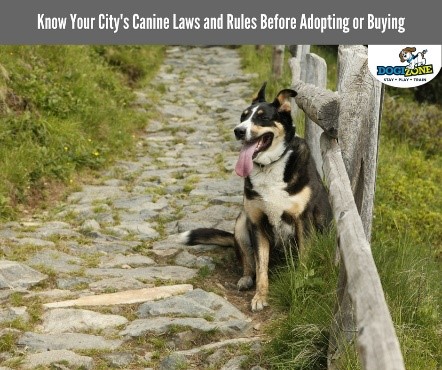Know Your Cities Canine Laws and Rules Before Adopting or Buying

Planning on buying or adopting a new puppy or dog is always an exciting time. However, if you live in an urban or suburban area, it is highly likely that you will also have dog ownership laws that should also be considered.
By taking the time to review your local canine laws, bylaws and rules you will have the ability to prevent some very serious problems after you get the dog or puppy home. Remember, these laws can and do change so don’t assume that laws that were or weren’t in place several years ago are still the same.
Breeds
One of the biggest concerns for most dog owners is the increasing number of dogs listed on breed bans. Most dog owners and dog lovers understand the ineffectiveness of these breed bans, but the public often erroneously believes that dog aggression is a breed problem rather than an owner problem.
Most commonly, breeds that have been linked to dog aggression, or mixed breed dogs of one or more of these breeds, are banned on these lists. This includes pit bulls, Staffordshire terriers, German Shepherd Dogs, Rottweilers, Chow Chows, Akitas, Doberman Pinschers, Cane Corsos, Presa Canarios, wolf-hybrids and Mastiffs.
In many areas, Huskies and Malamutes will also be on the list. Dogs that appear to be of these breeds can also be banned, even if there is no history of aggression or behavior problems.
Fences
In some jurisdictions, there are regulations as to the types and heights of fences that have to be in place for dogs that are outside. The fence must be demonstrated to be effective at keeping the dog on the owner’s property to prevent the dog from roaming or posing a threat to others.
In some areas, there is also a ban on chaining a dog, which is a very positive step. However, this may also limit the ability to use overhead runs and other types of devices if you do not have a fence in place.
Licenses
Within most urban and suburban areas, it is a legal requirement for a dog to be licensed in the jurisdiction. This is typically not a large cost, and some of the fees collected go to fund local shelters and support animal protection services in the community. Typically, a dog without a license will result in a small fine, but it can be more significant if the owner fails to take action.
On and Off-Leash
Even a well-behaved and obedient dog may be required to be on a leash at all times unless in designated off-leash areas in your city or town. This is a law that is put in place to ensure all dogs are under control when off their own property.
With all dogs required to be on a leash, the police or animal control officers are not forced to make a judgment call on how well behaved a dog is and if he or she can be off-leash.
Numbers
Finally, before bringing home a new puppy or a dog, check the number of pets you can legally have on your property. In some areas, there are limits of one or two dogs and cats, largely to prevent owners from having multiple pets that are a nuisance as well as a potential health and safety issue for those living in the same neighborhood.
